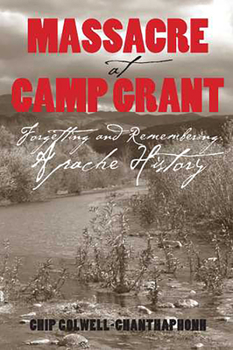Massacre at Camp Grant: Forgetting and Remembering Apache History
Select Format
Select Condition 
Book Overview
On April 30, 1871, an unlikely group of Anglo-Americans, Mexican Americans, and Tohono O'odham Indians massacred more than a hundred Apache men, women, and children who had surrendered to the U.S. Army at Camp Grant, near Tucson, Arizona. Thirty or more Apache children were stolen and either kept in Tucson homes or sold into slavery in Mexico. Planned and perpetrated by some of the most prominent men in Arizona's territorial era, this organized slaughter has become a kind of "phantom history" lurking beneath the Southwest's official history, strangely present and absent at the same time. Seeking to uncover the mislaid past, this powerful book begins by listening to those voices in the historical record that have long been silenced and disregarded. Massacre at Camp Grant fashions a multivocal narrative, interweaving the documentary record, Apache narratives, historical texts, and ethnographic research to provide new insights into the atrocity. Thus drawing from a range of sources, it demonstrates the ways in which painful histories continue to live on in the collective memories of the communities in which they occurred. Chip Colwell-Chanthaphonh begins with the premise that every account of the past is suffused with cultural, historical, and political characteristics. By paying attention to all of these aspects of a contested event, he provides a nuanced interpretation of the cultural forces behind the massacre, illuminates how history becomes an instrument of politics, and contemplates why we must study events we might prefer to forget.
Format:Paperback
Language:English
ISBN:0816525854
ISBN13:9780816525850
Release Date:May 2007
Publisher:University of Arizona Press
Length:176 Pages
Weight:0.55 lbs.
Dimensions:0.4" x 6.1" x 8.9"
Customer Reviews
2 ratings
Significant perspectives on important event
Published by Thriftbooks.com User , 15 years ago
Mr. Colwell-Chanthaphonh offers important perspectives and significant reflections on this regrettable event of American history. All of the studies now being done about this massacre--its background, the event itself, the aftermath, and its meaning in American history--have been sorely needed. This book is a wonderful contribution to remedying such ignorance.
A great addition for an anthropologist
Published by Thriftbooks.com User , 15 years ago
For anyone looking for a keen insight to the massacre of 1871, this book provides clear and well-presented evidence that the Apaches at Camp Grant were grossly mistreated and falsely accused of murder. The author is a passionate Tucsonan who has written and co-authored several well-researched Apache books. This book was born after a joint research project with several other anthropologists and Native Americans in the lower San Pedro Valley of southern Arizona. This book is an attempt to show why there were differences in the studies done on this grave incident, the 1871 Camp Grant Massacre, by Anglo-American historians, why the Apache version was rarely acknowledged, what differences there were between the US Americans and the Apaches when describing this event and the points of view focused on by the two main parties. The chapters are short. There are five chapters, each dealing with a different topic. The first chapter, "Phantom History," explains the methodologies used in this book. Using older versions written by US soldiers involved in this raid and massacre, the author points out grave and not-so-grave differences between every version. He also explains that much of the one-sided versions were simply because of the American attitudes toward all Native Americans at the time: the natives were savages that needed either to be destroyed or completely assimilated. Until they were assimilated, their culture was to be ignored. I enjoyed the second and third chapters the best, writing about six Apache versions of the same massacre. This was the one chapter devoted to Apache oral history. The rest of the chapters were more of an anthropological analysis of the sometimes vast differences between Anglo-American and Native American versions of this country's history. The third chapter, by far the longest chapter, is a synopsis of all the histories of southern Arizona that eventually led to the 1871 massacre, starting with the Spanish conquistadores, the Gadsen Purchase, the Civil War, westward expansion across the region, Mexican miners and other prospectors. Based on the author's analysis of food ration documents, he believes that the Camp Grant Apaches could not have committed the murders in and around Tucson on the dates that they happened because the murders were on the same date as when food was distributed. Also, travel time from their encampment to the murder scenese would have taken over a day by horse and was too far to be doable. The author claims that the Camp Grant Apaches were falsely accused of these murders and blames the real killers on the more eastern Chiricahua Apaches. Historical imagination is unavoidable, the author then goes on to say, as all things are subjective. But all versions of an event must be given equal consideration in order to provide more balanced reportage of history. White man has been grossly ethnocentric when it comes to writing its own history. The versions of the Native Americans must be g






